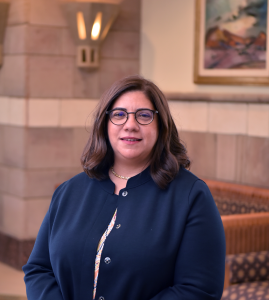Amina Elbendary is associate professor of Middle East History, Director of Graduate Studies and former chair at the Department of Arab and Islamic Civilizations, the American University in Cairo. Her research interests include Mamluk studies, social and cultural history of the premodern Middle East, Arabic historiography, and Islamic political thought.
Her publications include the monograph Crowds and Sultans: Urban Protest in Late Medieval Egypt and Syria (AUC Press). The book explores reports of urban protest and dissent in the cities of Egypt and Syria under the late Mamluk and early Ottoman regimes, and analyzes both the historiography of protest and the intricacies of urban politics in the late medieval period. She is also the co-author (with Dalia Said Mostafa) of The Egyptian Coffeehouse: Culture, Politics and Urban Space (I.B. Tauris). She is currently working on a research project related to popularization and late medieval historiography.
Elbendary earned her PhD in Oriental Studies from Clare Hall, University of Cambridge (2007). Before studying at Cambridge, she studied at AUC, earning an MA in Arabic studies with a specialization in Middle East history for her thesis “Histories of the Muslim Hero: Medieval and Modern Perceptions of al-Zahir Baybars” (1999) and a BA in political science (suma cum laude, 1996). At AUC, she was a recipient of the Riyochi Sasakawa Young Leaders Graduate Fellowship. She was also the winner of the Middle East Medievalists award for best graduate paper on a medieval topic in 1998.
She is co-organizer of the Annual History Seminar at the Department of Arab and Islamic Civilizations, a yearly event that brings together scholars of Egypt and the Arab world around a chosen theme. She is a member of the board of trustees of the Women and Memory Forum (WMF), an independent Egyptian research center that focuses on the study of women and gender in Arab cultural history. She is also an associate scholar of the Skilliter Center for Ottoman Studies, Newnham College, University of Cambridge and a member of the editorial board and co-Book Review Editor of the Turkish Historical Review (Brill) and member of the editorial board of Cairo Papers in Social Sciences (AUC Press) and al-Usur al-Wusta. She served on the jury of the Middle East Medievalists Dissertation Prize in 2020. She also serves on the Editorial Board of the Series “Critical Approaches to Arabic Historiography”, recently launched by Edinburgh University Press.
- Mamluk Egypt and Syria
- Social and cultural history of the Arab Middle East
- Arab-Islamic historiography
- Medieval and early modern popular culture
- Islamic political thought
- “The changing political roles of the ‘ulama in Egypt and Syria in the wake of the Ottoman conquest,” 1516: The Year that Changed the Middle East, Ed. Abdul-Rahim Abu Husayn (AUB Press, 2021), 137-162.
- The Egyptian Coffeehouse: Culture, Politics and Urban Space, with Dalia Said Mostafa (I.B. Tauris, 2020).
- Crowds and Sultans: Urban Protest in Late Medieval Egypt and Syria (AUC Press, 2015).
- “Between Riots and Negotiations. Urban Protest in Late Medieval Egypt and Syria,” Ulrich Haarmann Memorial Lecture, volume 3, ed. Stephan Conermann (Berlin: EBVerlag, 2012).
- “Muqaddima li kitāb Qāsim Amīn Tahrīr al-mar’ah wa kitāb Tal’at Ḥarb Tarbiyat al-mar’ah wa al-ḥijāb,” in Qāsim Amīn Tahrīr al-mar’ah wa Tal’at Ḥarb Tarbiyat al-mar’ah wa al-ḥijāb, (Alexandria: Library of Alexandria, 2012).
- “The historiography of protest in late Mamluk and early Ottoman Egypt and Syria,” International Institute of Asian Studies Newsletter, 43 (Spring 2007).
- al-Sa‘di, Huda and al-Bindāri, Amīna. Al-Awqāf fi sutūr wa suwar (Cairo: Women and Memory Forum, 2006).
- “The Worst of Times: Crisis Management and al-shidda al-`uzma,” in Money, Land and Trade: An Economic History of the Muslim Mediterranean, ed. Nelly Hanna (London and New York: I.B. Tauris, 2002).
- “The Sultan, The Tyrant and the Hero: Changing Medieval Perceptions of al-Zahir Baybars,”Mamluk Studies Review 5 (2001).


